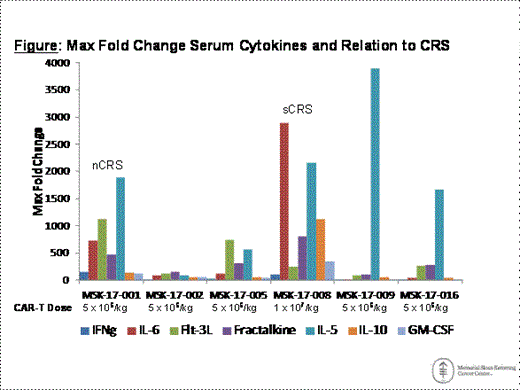Abstract
Background: Diffuse large B-cell lymphoma (DLBCL) is the most common aggressive B-NHL. While 50-80% of patients with DLBCL are cured with standard induction therapy, a large fraction of patients either relapse or have primary refractory (rel/ref) disease. High-dose therapy followed by autologous stem cell transplantation (HDT-ASCT) is the established standard of care for these patients. Despite this, approximately half of all rel/ref patients that are chemosensitive to salvage therapy are cured with this approach. Relapse is the major cause of treatment failure, and ultimately death, in these patients. Our group has demonstrated encouraging activity with 19-28z chimeric antigen receptor modified T cells (19-28z CAR-T) directed against CD19 in rel/ref ALL. We hypothesize that biologic optimization of cellular therapy with 19-28z CAR-T can be met immediately post-HDT-ASCT given: lymphoproliferative cytokine availability through lymphodepletion post-HDT, depletion of prohibitive regulatory cellular elements post-HDT and achievement of minimal residual disease prior to 19-28z CAR-T consolidation. Herein, we report safety data on the first 6 patients of the phase I MSKCC #12-117: 19-28z CAR-T post HDT-ASCT for poor-risk rel/ref aggressive B-NHL.
Methods: Eligibility for this study includes rel/ref aggressive B-NHL appropriate for HDT-ASCT as defined by chemosensitivity to salvage therapy and poor risk features including: 1) FDG-PET positivity following 2 cycles of salvage therapy or 2) bone marrow involvement of B-NHL at the time of rel/ref clinical restaging. Patients underwent separate apheresis for CD34+ progenitor cells and CD3+ T cells. T cells were transduced with a retrovirus encoding a CAR construct composed of anti-CD19 scFV linked to CD28 and CD3ζ signaling domains (19-28z). Patients were admitted for BEAM conditioned HDT and ASCT occurred day 0. Pegfilgrastim was administered on day+1 and 19-28z CAR-T dose per phase I study was split on days +2 and +3.
Results: This analysis includes the first six patients, all male, on the phase I study. The median age is 61 (range 34-68) years at the time of HDT-ASCT. Diagnoses included: n=2 relapsed and transformed follicular lymphoma (one with double-hit biology), n=3 relapsed DLBCL (one CD5+) and one subject with relapsed and transformed marginal zone lymphoma involving the bone marrow. Five patients were treated at dose level #1 (5 x106 19-28z CAR-T/kg) with no dose-limiting toxicity (DLT) observed. Four of the five patients at dose level #1 experienced grade 3 febrile neutropenia and one patient met-criterion for non-severe cytokine-release syndrome (nCRS) effectively treated with tocilizumab 4 mg/kg x1. One patient was treated at dose-level #2, 1 x107 CAR-T/kg, and experienced a DLT of grade 4 severe CRS (sCRS) manifested with acute kidney injury, hypotension and mental status changes effectively treated and fully recovered with tocilizumab in combination with dexamethasone. Peak CRP in all patients was observed at a median of 3.5 days (range 3-4 days) post-19-28z CAR-T infusion (median peak CRP= 17 mg/dL, range: 5-43.1 mg/dL), with CRP >20 mg/dL identified in the two patients that experienced CRS (nCRS=27 mg/dL, sCRS=43 mg/dL). Previously associated serum cytokine elevations (Davila et al Sci Trans Med, 2014) were observed in the two patients that experienced CRS (Figure). All patients engrafted neutrophils at a median of 10 days (range: 9-10 days) post-ASCT, and achieved a complete remission at first post-HDT-ASCT restaging. No sequelae of autoimmune phenomenon were observed. At a median follow-up of six months, with 2 patients >one year post HDT-ASCT, all patients remain alive and in remission.
Conclusions: This is the first report of 19-28z CAR-T cells in conjunction with consolidative HDT-ASCT for poor-risk rel/ref aggressive B-NHL. No DLTs have been observed at dose level #1, 5 x106 19-28z CAR-T/kg, while sCRS was observed in n=1 at 1 x107 CAR-T/kg resulting in a DLT. CRS was associated with pro-inflammatory serum cytokine elevation. CRS was aborted with tocilizumab with (sCRS=1) or without (nCRS=1) dexamethasone. All patients engrafted neutrophils at the expected time point. The use of 19-28z CAR T cells is a promising approach in this small group of poor-risk PET+ NHL patients undergoing autologous transplant. This is an ongoing trial and updated data will be presented.
Riviere:Juno Therapeutics: Consultancy, scientific co-founders Other. Sadelain:Juno Therapeutics: Consultancy, Scientific co-founder and Stock holder Other. Brentjens:Juno Therapeutics: Consultancy, scientific co-founder Other.
Author notes
Asterisk with author names denotes non-ASH members.


This feature is available to Subscribers Only
Sign In or Create an Account Close Modal